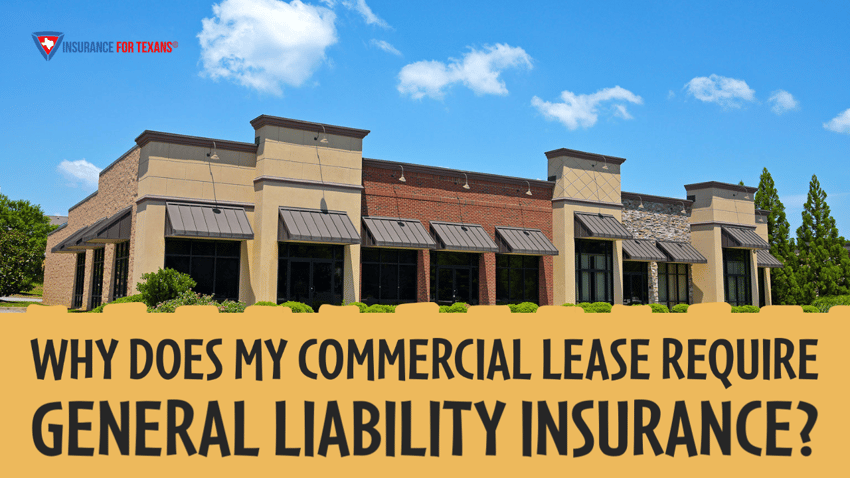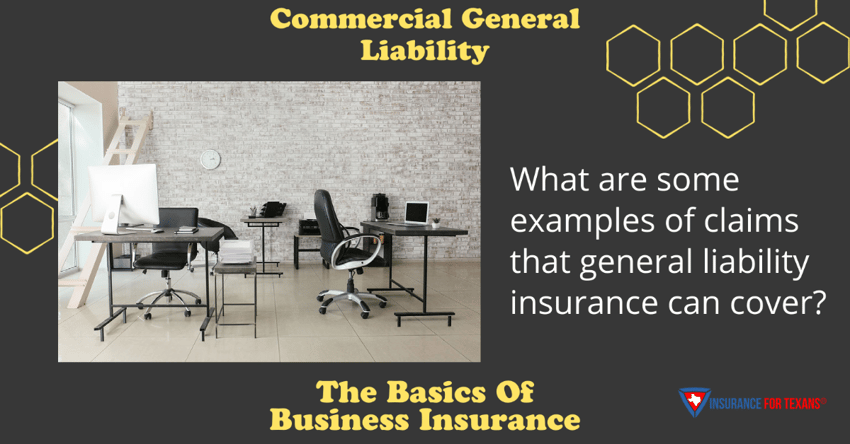If you are a business owner who rents space, you may be wondering why your landlord requires you to carry general liability insurance. After all, you're not the one who owns the building. So why would the landlord want you to spend more money on insurance? It's actually commonplace for landlords to require at least general liability insurance from you as a tenant. This requirement is because your landlord doesn't want to be financially responsible for incidents that happen at your place of business. Especially if someone is injured or worse. But there are actually more reasons why Texas landlords require this type of insurance from their tenants.

What Is General Liability Insurance?
General liability insurance, also known as commercial general liability insurance (CGL), is a type of insurance that covers businesses for third-party liability claims. This means that if someone is injured or their property is damaged as a result of your business's operations, your insurance company will pay for their losses.
General liability insurance can cover a wide variety of claims, including:
- Slips and Falls (Bodily Injury)- This is one of the most common types of general liability insurance claims. It occurs when someone slips and falls on your property and is injured.
- Property damage- This type of claim occurs when someone's property is damaged as a result of your business's operations. For example, if a delivery driver damages a customer's property while delivering a package, your general liability insurance may cover the damages.
- Personal injury- This type of claim occurs when someone is injured as a result of your business's operations. For example, if a customer is injured by a defective product that you sell, your general liability insurance may cover the damages.
- Advertising Injuries- This type of claim occurs when someone is injured as a result of false or misleading advertising. For example, if you advertise that your product is safe when it is actually dangerous, your general liability insurance may cover the damages.
- Product Liability- This type of claim occurs when someone is injured by a defective product that you sell. For example, if a child is injured by a toy that you sell, your general liability insurance may cover the damages.
It is important to note that general liability policies do not cover all types of claims. For example, it does not cover employee injuries, auto accidents, or intentional acts. General liability insurance is a valuable asset for businesses of all sizes. It can help to protect your business from financial losses in the event of a lawsuit, and it can also help to keep your business running if you are sued.
Why Does Your Landlord Require It?
There are a few reasons why your landlord might require you to carry general liability insurance. First, it protects them from financial losses in the event that someone is injured on your property. For example, if a tenant slips and falls in your office and is injured, the landlord could actually be held liable. Your General Liability policy would help to pay for the tenant's medical expenses and other costs which would lower the landlord's risk of a potential lawsuit.
Second, general liability insurance can help secure the financial security of your business remaining a tenant in their building. As a business owner, if you are sued and don't have insurance, you could be forced to close your business simply from the cost of defending the lawsuit. Much less if a judgement is rendered that you must pay. Either of these items could mean that you were ultimately unable to pay your rent, leaving the landlord in a difficult financial situation.
Lastly, it may be a requirement of their own commercial landlord insurance. Many insurance companies who provide landlord insurance will require the landlord to provide proof of coverage for the tenants to offer terms of coverage. The landlord insurance providers' main objective is to make sure that if there is a lawsuit against the landlord for the tenant's action, then the landlord can find primary coverage under the tenant's policy. This is to reduce the risk of the landlord's commercial property insurance policy needing to defend a lawsuit because of something that your business caused. In addition, the landlord's carrier wants to verify that the tenant, should they negligently damage the building, has coverage for partial or full damages. This can be from something as simple as water damage, or more complex like a natural disaster.

What Are Some Examples Of Claims That General Liability Insurance Can Cover?
Here are a few examples of claims that general liability insurance can cover:
- A tenant slips and falls in your office and is injured.
- A customer trips and falls on a loose rug in your lobby.
- A delivery person is injured while delivering a package to your office.
- A fire breaks out in your office and damages the property of other tenants.
The specific coverage that your general liability insurance provides will depend on the terms of your insurance policy. It is important to read your insurance policy carefully to understand what is covered and what is not. A list of exclusions will limit what your policy does cover.
If you are a tenant in a commercial lease, you should make sure that you have the appropriate amount of general liability insurance. The amount of coverage that you need will depend on the size and type of your business, as well as the specific requirements of your lease. While the majority of commercial leases require a minimum of $1,000,000 per occurrence and $2,000,000 aggregate, these limits may not be adequate enough to cover the actual exposures your individual business faces.
You should also make sure that your policy includes coverage for all of the activities that your business engages in. For example, if you sell products, you will need to make sure that your policy covers product liability claims. If you provide professional services such as a lawyer, physician, engineer, or other professional provider it is important to review professional liability exposures not covered by general liability insurance.
If you are unsure about how much liability coverage you need or what type of coverage you should have, you should talk to your independent insurance agent who specializes in commercial insurance. They can help you to choose the right policy for your business and your needs.
Why Is It In Your Landlord's Best Interests To Require General Liability Insurance From You?
As you can see, there are a number of reasons why a property owner may require you to carry general liability insurance. It protects them from financial losses, it helps to provide coverage for negligent damage to their property, and other potential claims. If you're an office tenant, it's important to understand why your landlord requires this type of insurance and to make sure that you have the coverage you need.
In addition to general liability insurance, your commercial lease may include additional requirements. It is not uncommon for the lease to require coverage for property, personal property including finish-outs, business income insurance, and in some situations, workers' compensation. Texas does not require most private employers to have workers' compensation insurance, but a landlord may still require it as part of a commercial lease. If an employee of yours is injured on the job, the landlord could be held liable, even if you were not directly responsible for the injury. Worker's compensation insurance will help to protect the landlord from these financial losses.
It is also very important to understand what you are agreeing to be responsible for as the tenant. Some leases pass along responsibility for the maintenance of the common areas, the parking lots, and more. It is important that you discuss these requirements with your insurance agent so that they can account for all exposures you are agreeing to in your lease. In some instances, landlords may pass along the total cost of the commercial building insurance through a triple-net lease. These requirements generally will require you to list your landlord as an additional insured on your policy as well.
How Much Does General Liability Insurance Cost?
The cost of general liability insurance varies depending on a number of factors, including:
- The size and type of your business: Larger businesses with more employees and assets will typically pay more for general liability insurance than smaller businesses.
- The nature of your business: Businesses that operate in high-risk industries, such as construction or manufacturing, will typically pay more for general liability insurance than businesses in low-risk industries, such as retail or service.
- Your location: The cost of general liability insurance can vary depending on the state in which you operate your business.
- Your claims history: If you have had a history of claims, you will likely pay more for general liability insurance than a business with a clean claims history.
It is important that you work with an independent insurance agent experienced in your particular industry and location. An experienced commercial insurance agent can help you understand the insurance requirements of your lease, as well as your individual business exposures to make sure you purchase the right insurance coverage from the right insurance carrier.
Where Can My Business Get Coverage?
General liability is a common requirement for most commercial lease agreements. However, when considering a general liability policy, it is more important that you take into consideration the coverage provided by the insurance policy to your individual business rather than to the landlord's interests. First and foremost, you should be purchasing coverage with the intent to protect your business, while also satisfying any lease requirements from your landlord. Reviewing your business insurance coverage starts with a call to your preferred independent insurance agent. Don't have one? The commercial insurance advisors at Insurance For Texans would be happy to discuss your particular needs and provide custom solutions within your budget to ensure that your liability insurance policies match your risk profile and needs. Click the button below to get started.



